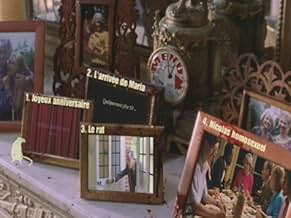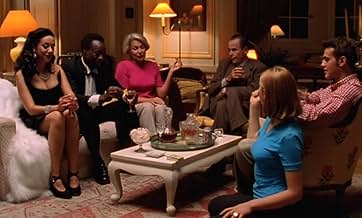VALUTAZIONE IMDb
6,6/10
5764
LA TUA VALUTAZIONE
Aggiungi una trama nella tua linguaThe adventures of an upper-class suburban family dealing with their younger brother's homosexuality, elder sister's suicide attempt, masochist tendencies, and a free-spirited maid and her hu... Leggi tuttoThe adventures of an upper-class suburban family dealing with their younger brother's homosexuality, elder sister's suicide attempt, masochist tendencies, and a free-spirited maid and her husband.The adventures of an upper-class suburban family dealing with their younger brother's homosexuality, elder sister's suicide attempt, masochist tendencies, and a free-spirited maid and her husband.
- Premi
- 3 vittorie e 3 candidature totali
Recensioni in evidenza
François Ozon's pitch black mickey take is a biting satire on family life and a brash distraction from the shows of it's title. While many sitcom's are monotonous affairs, Ozon's take on the medium is anything but. Despite taking in many of the clichés of the sitcom - stuffy mother, raunchy maid, bored father etc - Sitcom manages to be continually inventive and the way that it exposes the clichés of the genre is both ludicrously ridiculous and harshly disturbing. The French director proves with this movie that he's not afraid to overstep several boundaries and make a film that dares to be different, and for that reason this film will never be universally liked. However, if you can connect with Ozon's vision, you're in for a treat and that was the situation I found myself in! The story follows a father who, after bringing his family a lab-rat for a present, finds his family collapsing around him - his son discovers he's gay, his daughter jumps out of the window and his wife...well, I'll leave you to find that out on your own.
Sitcom is a singularly unpleasant experience. Watching family life deteriorate is a much more gruelling affair than you might imagine, and even though the family and the situation that Ozon has presented are utterly ridiculous; he still manages to inject life into it, which ensures that it hammers home the point that the auteur intended. Whenever I see a film that dares to be different and deliver something that I haven't seen before, I tend to find myself heaping the praise on it and that is certainly the case with this film. You will not find a comedy with a more rotten core than this one and similarly you will not find one that dares to present the utterly ridiculous happenings that this movie thrives on. I don't know how Ozon thought he could get away with some of the things in this film - not just the taboo's he's portrayed, but other things too, some of which are just too stupid to comprehend but Ozon makes them work! Sitcom is a movie that needs to be experienced, and it's a film that will divide opinions as much as any other movie ever made. And if only for that reason - see this film as soon as possible.
Sitcom is a singularly unpleasant experience. Watching family life deteriorate is a much more gruelling affair than you might imagine, and even though the family and the situation that Ozon has presented are utterly ridiculous; he still manages to inject life into it, which ensures that it hammers home the point that the auteur intended. Whenever I see a film that dares to be different and deliver something that I haven't seen before, I tend to find myself heaping the praise on it and that is certainly the case with this film. You will not find a comedy with a more rotten core than this one and similarly you will not find one that dares to present the utterly ridiculous happenings that this movie thrives on. I don't know how Ozon thought he could get away with some of the things in this film - not just the taboo's he's portrayed, but other things too, some of which are just too stupid to comprehend but Ozon makes them work! Sitcom is a movie that needs to be experienced, and it's a film that will divide opinions as much as any other movie ever made. And if only for that reason - see this film as soon as possible.
This film is, above all else, a farce. As a farce it works very well and is, in many parts, extremely funny. A regular in Ozon's films, Lucia Sanchez, is excellent as the Spanish maid, and the mother is played to utter perfection by Evelyn Dandry. She is able to portray the utter frustration of any woman with teenage children. Ozon doesn't really cut new ground with this film, with its theme of the disruption of French bourgeois family life, but I don't think that he intends to. The film is funny on its own terms. The notion of Ozon being 'naughty' shines through. Of course, the utter beauty of Stephane Rideau makes the whole thing worthwhile by itself.
I love Francois Ozon's films. Together with this, I have seen all his feature-length work (Sitcom, Criminal Lovers, Drops Falling On Burning Rocks, Under the Sand, 8 Women, Swimming Pool). "Sitcom" is the film by him that I found the most bizarre and unsettling (even though I had some good laughs). The ending was a bit too much, but otherwise, I quite liked it. The atmosphere and the bizarre events sometimes reminded me of "Criminal Lovers", that he made immediately afterwards, but with more focus on black humor than in the latter.
The whole way through, the story of "Sitcom" reminded me of Pier Paolo Pasolini's "Theorem" (Teorema) - much more than of Bunuel's "The Discreet Charm of the Bourgeoisie", already mentioned here. In Pasolini's 1968 film, a strange visitor unsettles the life of an Italian bourgeois family: after he leaves, the daughter loses her mind, starts lying catatonicly on her bed and has to be transferred to a mental institution; the mother, in a desperate urge for promiscuity, picks up handsome young men on the streets for sex; the maid goes back to her village and becomes a levitating saint; the son discovers his talent for painting (and probably realizes that he is gay); the father at first seems not to be affected, but then he also succumbs to the influence.
Ozon's film seems to take up this motif and transfer it to a very-very black farce and a parody of American sitcoms (I love the set design with all those bright colors!). People here (especially the mother) always try to "talk things out" like in the sitcoms, but it doesn't really work, because the environment is/has become so different.
At the very end, though, everyone seems to have found themselves at last: from a dysfunctional family, they have apparently become a happy family again - though not exactly in the traditional, conservative way. But the white rat is still lurking everywhere...
The whole way through, the story of "Sitcom" reminded me of Pier Paolo Pasolini's "Theorem" (Teorema) - much more than of Bunuel's "The Discreet Charm of the Bourgeoisie", already mentioned here. In Pasolini's 1968 film, a strange visitor unsettles the life of an Italian bourgeois family: after he leaves, the daughter loses her mind, starts lying catatonicly on her bed and has to be transferred to a mental institution; the mother, in a desperate urge for promiscuity, picks up handsome young men on the streets for sex; the maid goes back to her village and becomes a levitating saint; the son discovers his talent for painting (and probably realizes that he is gay); the father at first seems not to be affected, but then he also succumbs to the influence.
Ozon's film seems to take up this motif and transfer it to a very-very black farce and a parody of American sitcoms (I love the set design with all those bright colors!). People here (especially the mother) always try to "talk things out" like in the sitcoms, but it doesn't really work, because the environment is/has become so different.
At the very end, though, everyone seems to have found themselves at last: from a dysfunctional family, they have apparently become a happy family again - though not exactly in the traditional, conservative way. But the white rat is still lurking everywhere...
Before his first real feature-length film, François Ozon produced an impressive chain of short films during his cinema student years and beyond. In 1997, the medium-length film "Regarde La Mer" made many film lovers put hopes in this voracious filmmaker. When he was a cinema student, one of his professors kept on repeating him: "Go on! Make movies. Believe in what you're making!". This leitmotiv remained stuck on his mind since Ozon makes at least one movie a year. Passion has no limits. But now back in 1998 about "Sitcom", a cannonball in the calm landscape of French cinema which was written in a fortnight and shot in one month, this quirky offering was disowned by a good part of the French press specialized in cinema and it's easy to see why. It was too much for them to give thumbs up to this special piece of work which already showcases the Ozon style.
This first offering already lets see his influences, his cinematographic, cinema-going tastes. It spans Claude Chabrol for the bourgeois milieu, Luis Bunuel for the will to shatter this milieu through unexpected means and some dreamlike sequences. Furthermore, the beginning of the film with the arrival of the Spanish maid in the desirable mansion echoes to the scene with the arrival of the bishop hired as a gardener to the Sénéchals in "Le Charme Discret De La Bourgeoisie" (1972) or even the arrival of Jeanne Moreau to the Monteils in "Le Journal D'Une Femme De Chambre" (1964) and Ozon clouds the issues with some indications such as "a few months sooner" or "a few months later" like in "Un Chien Andalou" (1928) or "l'Age D'or" (1930) and give the whole an unreal side. Then, like the "king of bad taste and extravagance" (you probably guessed his name) author of "Serial Mom" (1994), Ozon has a liking for trash humor and shocking.
"Sitcom" also presents the seeds of what will be developed later in Ozon's subsequent films, notably the sublime "8 Femmes" (2002) or "Swimming Pool" (2003): a will to enclose his characters in an isolated space to shatter them and to lay bare what's going on in their tormented minds. Also a freewheeling look on sexuality and the inclusion of the grotesque and the admirable.
Here, Ozon takes the corny clichés of the sitcom and explodes them through defaced scenery, ugly cinematography and characters who are devoid of interest and are only puppets. The father who only expresses himself through proverbs and can't see for a long time the disorder which reigns in the house. The mother a little uptight who struggled hard to keep order and harmony. The son, serious at the outset who discovers his homosexuality and gradually becomes outgoing. The daughter, an artist who seems marooned in her education and her life. Possible exit: suicide. An universe which goes awry because of a white rat which sets the depths of the unconscious free.
If one accepts without ulterior reasons, the preposterous staple idea I have just mentioned, "Sitcom" is much fun to watch. The topic could also have given birth to a satire of the bourgeois milieu but it rather takes a back seat. Instead, Ozon prefers to unleash his perverse frenzy of a sadistic child. He apes the nasty piece of work through a series of sequences, perhaps a little loosely linked up and dovetailed but they are virtually all funny and peppered with perennial, nagging black humor and powerful lines. Ozon will keep to the tail end these features and this assumed schoolboy tone. Different sexual moments may give the film a catalog side but they are virtually all filmed with a certain reserve.
The actors all match with their respective roles. One will notice the presence of Marina De Van who before had already worked with Ozon (see "Regarde La Mer") and will after. By the way, her gruesome film "Dans Ma Peau" (2002) isn't suitable for the general public. Anyway, Evelyne Dandry's acting has strong resonances with Hélène Vincent's in Etienne Chatiliez' debut and best film "la Vie Est Un long Fleuve Tranquille" (1988) and François Marthouret's solemn cues could be worth alone the price of admission.
"Sitcom" is a dirty, unreal treat brimming with naughtiness. Ozon's trademark is already palpable in his debut film which, however isn't for all tastes. Make up your mind if you find it repulsive or hilarious.
This first offering already lets see his influences, his cinematographic, cinema-going tastes. It spans Claude Chabrol for the bourgeois milieu, Luis Bunuel for the will to shatter this milieu through unexpected means and some dreamlike sequences. Furthermore, the beginning of the film with the arrival of the Spanish maid in the desirable mansion echoes to the scene with the arrival of the bishop hired as a gardener to the Sénéchals in "Le Charme Discret De La Bourgeoisie" (1972) or even the arrival of Jeanne Moreau to the Monteils in "Le Journal D'Une Femme De Chambre" (1964) and Ozon clouds the issues with some indications such as "a few months sooner" or "a few months later" like in "Un Chien Andalou" (1928) or "l'Age D'or" (1930) and give the whole an unreal side. Then, like the "king of bad taste and extravagance" (you probably guessed his name) author of "Serial Mom" (1994), Ozon has a liking for trash humor and shocking.
"Sitcom" also presents the seeds of what will be developed later in Ozon's subsequent films, notably the sublime "8 Femmes" (2002) or "Swimming Pool" (2003): a will to enclose his characters in an isolated space to shatter them and to lay bare what's going on in their tormented minds. Also a freewheeling look on sexuality and the inclusion of the grotesque and the admirable.
Here, Ozon takes the corny clichés of the sitcom and explodes them through defaced scenery, ugly cinematography and characters who are devoid of interest and are only puppets. The father who only expresses himself through proverbs and can't see for a long time the disorder which reigns in the house. The mother a little uptight who struggled hard to keep order and harmony. The son, serious at the outset who discovers his homosexuality and gradually becomes outgoing. The daughter, an artist who seems marooned in her education and her life. Possible exit: suicide. An universe which goes awry because of a white rat which sets the depths of the unconscious free.
If one accepts without ulterior reasons, the preposterous staple idea I have just mentioned, "Sitcom" is much fun to watch. The topic could also have given birth to a satire of the bourgeois milieu but it rather takes a back seat. Instead, Ozon prefers to unleash his perverse frenzy of a sadistic child. He apes the nasty piece of work through a series of sequences, perhaps a little loosely linked up and dovetailed but they are virtually all funny and peppered with perennial, nagging black humor and powerful lines. Ozon will keep to the tail end these features and this assumed schoolboy tone. Different sexual moments may give the film a catalog side but they are virtually all filmed with a certain reserve.
The actors all match with their respective roles. One will notice the presence of Marina De Van who before had already worked with Ozon (see "Regarde La Mer") and will after. By the way, her gruesome film "Dans Ma Peau" (2002) isn't suitable for the general public. Anyway, Evelyne Dandry's acting has strong resonances with Hélène Vincent's in Etienne Chatiliez' debut and best film "la Vie Est Un long Fleuve Tranquille" (1988) and François Marthouret's solemn cues could be worth alone the price of admission.
"Sitcom" is a dirty, unreal treat brimming with naughtiness. Ozon's trademark is already palpable in his debut film which, however isn't for all tastes. Make up your mind if you find it repulsive or hilarious.
This is an odd film about a father who brings a pet rat home to his family, which then sparks off their innermost sexual desires. The son announces he's gay, and ends up with a maid's boyfriend; the daughter jumps out of the window and is paralysed, and then gets her boyfriend to hurt her while she puts cigarettes out on her arm. The wife starts to sleep with the gay son. The daughter asks her father to have sex with her, but he declines, saying she's ugly. The ending is really surreal. Wacky, satirical, perverse & crazy. See it if you can.
Lo sapevi?
- QuizFrançois Ozon admitted in interviews that his dream cast for the film would have been for Lana Turner to play the daughter and Bette Davis her mother.
- ConnessioniReferenced in 8 donne e un mistero (2002)
- Colonne sonoreSymphoniie no 1 (Feirlich II)
Music by Gustav Mahler (as G. Mahler)
I più visti
Accedi per valutare e creare un elenco di titoli salvati per ottenere consigli personalizzati
- How long is Sitcom?Powered by Alexa
Dettagli
Contribuisci a questa pagina
Suggerisci una modifica o aggiungi i contenuti mancanti























